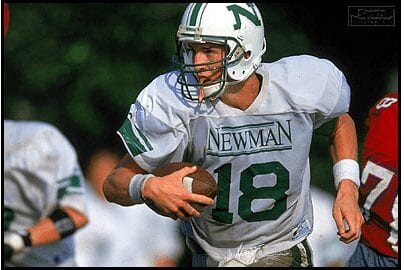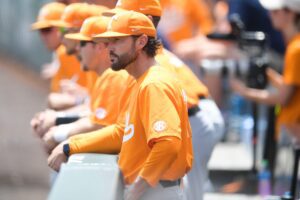Looking over the career achievements of Peyton Manning
On Monday, “The Sheriff” turned in his badge and gun. Contributor Nicholas Gunnell looks over one of the greatest NFL careers in history.

Photo by Tripp Pelfrey, courtesy of creativecommons.org. No changes made.
[title_box title=”Looking over the career achievements of Peyton Manning”]
Louisiana native Peyton Manning comes from a family of quarterbacks. His father, Archie, was a quarterback and his younger brother, Eli, is also a quarterback.
In his hometown of New Orleans, Manning began his career in football playing high school ball at Isidore Newman School. He led the team as the starting quarterback for three seasons with a total record of 34-5. While in high school, he started wearing the number 18 in honor of his older brother, Cooper, who had to give up football due to spinal stenosis.
In 1994, Manning went on to play in college at the University of Tennessee. As the third-string quarterback, Manning was soon called up to start after injuries knocked out his predecessors, Todd Helton and Jerry Colquitt. Manning ended his freshman campaign with a 7-1 record as a starter and the Vols finished the season 8-4 with a win against Virginia Tech in the Gator Bowl. The starting position was Manning’s from that point on.
The 1995 season was a big one for Manning and the Vols. They went 11-1, with another bowl win against Ohio State. The Vols ended the season ranked third in the nation. And Manning finished sixth in the Heisman vote. In 1996, Manning and the Vols went 10-2, also winning the Citrus Bowl for the second-straight year against Northwestern.
In 1997, Manning was expected to leave early and go on to the NFL, but decided to return for his final year with the Vols. Manning and the Vols ended up with a 10-1 record for the regular season. Their only loss of the regular season came from Florida for the third straight year. They advanced to the SEC Championship against Auburn, where they won 30-29. The Vols then faced Nebraska in the Orange Bowl. With a Tennessee win and a Michigan loss, Tennessee likely would have won the national championship. Unfortunately, the Vols were not able to stop Nebraska’s running attack, falling 42-17. That season, Manning won the Maxwell Award, the Davey O’Brien Award, and many other quarterback awards, despite not winning the Heisman.
In the 1998 NFL Draft, Manning was selected as the No. 1 overall pick by the Indianapolis Colts. He started right away with the Colts, and continued to start for the next 13 seasons. While playing for the Colts, Manning won four MVP awards and also won Super Bowl XLI in 2006. In 2009, Manning and the Colts returned to the Super Bowl to face off against the New Orleans Saints. The Colts lost 31-17, giving Manning a 1-1 Super Bowl record.
The 2011 season was one without Manning. He underwent neck surgery in May of that year and was unable to recover fully in time. After an MRI, doctors told Manning he needed spinal fusion surgery. Manning was ruled out of the season opener against the Houston Texans. It was the first game he had not started in 208 games (227 games including playoffs). Manning underwent a second surgery that ensured him missing the 2011 season. The Colts went 2-14 that year. The Colts had the No. 1 pick in the 2012 NFL Draft and owed a roster bonus of $28 million to Manning. Future quarterback Andrew Luck was at the top of the list. Manning was released from the Colts March 7, 2012. He responded in an emotional press conference to Colts fans, “Thank you for letting me be your quarterback.”
After that, Manning took his talents to Denver.
In 2012, Manning and the Broncos were able to work out a five-year deal worth $96 million. At that time, the No. 18 jersey was retired in honor of Frank Tripucka, but Tripucka gave Manning permission to wear it. In 2013, Manning won his fifth MVP award and helped the Broncos advance to Super Bowl XLVII. The Broncos lost to the Seattle Seahawks 43-8. In the 2014 season, Manning passed Brett Favre to become the NFL’s all-time leader in passing touchdowns with 509.
The 2015 season would be Manning’s 18th and fourth with the Broncos. In week 10, he passed Favre for the most career passing yards. But in that same game, he also threw four interceptions and was taken out of the game. At the end of the regular season, a 12-4 record gave Denver the No. 1 seed in the AFC and home field advantage in the playoffs. Manning and the Broncos were able to fight their way to Super Bowl 50, where they faced the regular season 15-1 Carolina Panthers and regular season MVP Cam Newton. The Broncos defeated the Panthers 24-10, giving Manning his second Super Bowl victory. This gave Manning his 200th career win, the most in NFL history by a starting quarterback.
That proved to be his final football game.
In Manning’s press conference Monday, he told the world, “After 18 years, it’s time.” He said he has no idea what he will do in retirement and added, “Life isn’t shrinking for me.”
After that, he ended with one final word.
“Omaha.”
Featured image by Tripp Pelfrey
Edited by Cody McClure



